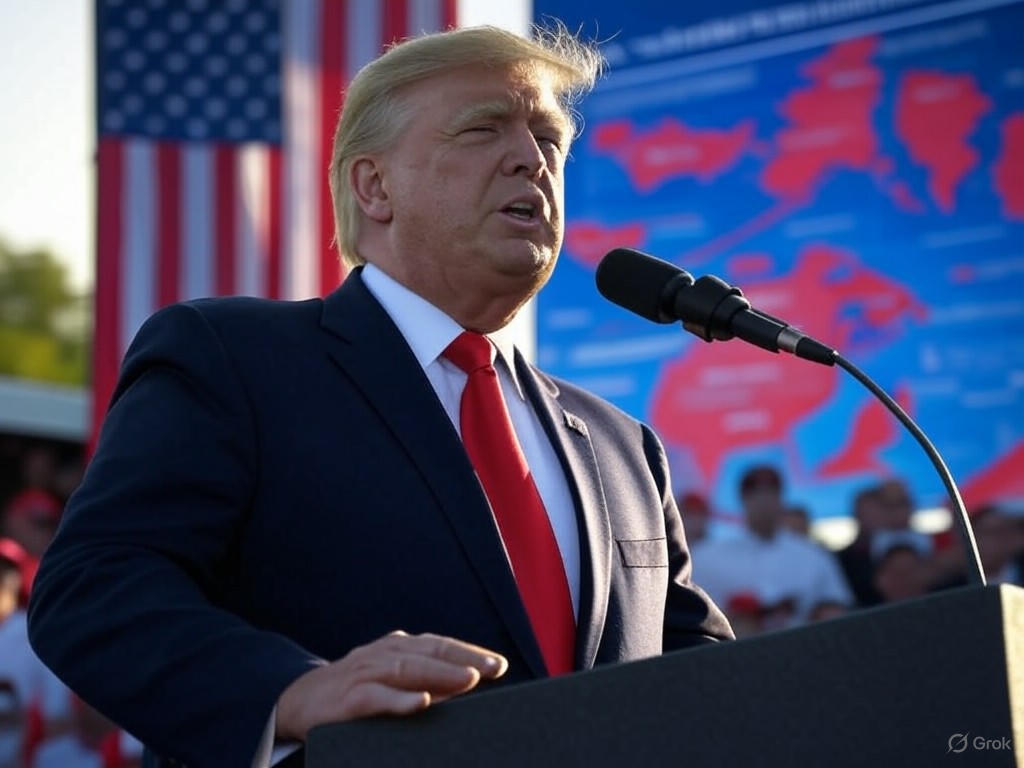Trump’s Annexation Threats: BC’s Sovereignty in Global Spotlight
In the grand tapestry of international relations, where bluster often masquerades as policy, few figures have stirred the pot quite like Donald Trump. Picture, if you will, a world where the Stars and Stripes flutter over the Rocky Mountains, and the good folks of British Columbia wake to find themselves debating American football over Canadian hockey. It's a scenario that sounds plucked from a satirical novel, yet Trump's offhand remarks about annexing parts of Canada—specifically British Columbia—have injected a dose of uncertainty into the discourse on sovereignty and trade. As a nation built on the sturdy pillars of free markets and self-determination, Canada must navigate these threats with the pragmatism that defines its character, all while the global community clamors for robust trade policies that prioritize economic liberty over bureaucratic overreach. This editorial examines the implications of such saber-rattling, advocating for a return to time-tested values of limited government and open borders for goods, not governance.
The Annexation Rhetoric: A Storm in the Teacup?
Trump's comments, uttered during his presidency and echoed in recent interviews, have painted a provocative picture of territorial expansion. In 2018, for instance, he jestingly suggested that Canada could become the 51st state, a quip that nonetheless carried undertones of frustration with trade imbalances. Fast-forward to today, and these remarks resurface amid ongoing U.S.-Canada tensions, particularly over energy exports and border security. While one might dismiss this as the bloviations of a showman, the implications for British Columbia—a province rich in natural resources and strategic ports—cannot be ignored. Its sovereignty, rooted in Canada's federal structure, represents not just a line on a map but a bulwark against the encroachment of big-government impulses that threaten individual freedoms.
At its core, this rhetoric underscores a broader debate about national boundaries in an interconnected world. From a center-right vantage, the allure of annexation lies in the potential for streamlined trade and resource sharing, but it risks undermining the very principles that make free markets thrive: mutual respect and voluntary exchange. As The Wall Street Journal reported in a 2023 analysis, such talk could erode investor confidence, with Canadian stocks dipping in response to perceived instability. Yet, it's worth noting that Trump's approach, while brash, highlights legitimate grievances about trade deficits—grievances that demand addressing through negotiation, not conquest.

Former President Trump delivers a speech on U.S. trade relations, underscoring the fine line between rhetoric and reality in international diplomacy.
Implications for British Columbia's Sovereignty: A Delicate Balance
The prospect of annexation threats hits close to home for British Columbia, where economic ties to the U.S. are as deep as the Pacific Ocean that borders it. This western jewel of Canada, with its vast timberlands, mining operations, and burgeoning tech sector in Vancouver, stands as a testament to the benefits of free trade agreements like the United States-Mexico-Canada Agreement (USMCA). However, Trump's saber-rattling raises alarms about sovereignty, defined not merely as territorial integrity but as the ability to chart one's own economic course without undue external pressure.
Consider the potential fallout: If U.S. policymakers were to leverage trade negotiations to encroach on Canadian autonomy, it could lead to a chilling effect on investment. British Columbia's economy, heavily reliant on exports of lumber and liquefied natural gas to the U.S., might face tariffs or restrictions that echo the protectionist policies of the past. From a center-right perspective, this is where limited government shines brightest—by fostering an environment where businesses operate freely across borders, rather than succumbing to the whims of political strongmen. As CBC News outlined in a detailed 2024 report, public sentiment in B.C. leans toward bolstering defenses through diplomatic channels, emphasizing that true sovereignty lies in economic resilience, not isolationism.
Yet, balance demands acknowledgment of the opportunities. Strengthened trade ties, if pursued thoughtfully, could enhance prosperity for both nations. Imagine a scenario where regulatory barriers are minimized, allowing British Columbia's innovators to access American markets without the red tape that bloated bureaucracies often impose. This isn't about ceding ground but about embracing the entrepreneurial spirit that built North America. As long as governments resist the temptation to overregulate, the free market can serve as a natural safeguard against annexation fantasies.
Global Calls for Strengthened Trade Policies: The Path Forward
Amid these local tensions, the global stage amplifies the need for robust trade frameworks. Nations worldwide are heeding calls to fortify trade policies, particularly in the wake of supply chain disruptions from the COVID-19 pandemic and geopolitical shifts. For Canada, this means reinforcing its position in agreements like the USMCA while advocating for policies that prioritize free-market principles over subsidies and state interventions. Trump's era of "America First" policies, though flawed in their execution, spotlighted the importance of fair trade deals that protect domestic industries without resorting to outright protectionism.
Evidence from international analyses supports a measured approach. According to a Heritage Foundation study, countries that emphasize limited government interference in trade—such as through reduced tariffs and streamlined regulations—see faster economic growth and innovation. In the context of British Columbia, this could mean negotiating bilateral deals that secure energy exports while maintaining sovereignty, turning potential threats into opportunities for mutual benefit. Similarly, The Economist argued in a 2023 editorial that global trade resilience hinges on rejecting zero-sum games in favor of reciprocal agreements, a nod to traditional values of cooperation without compromising national identity.
Herein lies the sardonic irony: In an age where leaders toss around annexation like a poker chip, the real winners are those who play the long game of economic diplomacy. Strengthening trade policies isn't about erecting walls—literal or metaphorical—but about building bridges that honor sovereignty while unlocking the potential of free markets. For British Columbia, this means investing in domestic infrastructure and education to reduce reliance on foreign whims, all while engaging in global forums to advocate for open trade lanes.

A detailed map illustrating British Columbia's key trade corridors with the U.S., emphasizing the economic interdependence that underpins North American sovereignty.
Conclusion: Charting a Course for Stability and Prosperity
As we reflect on Trump's annexation threats and their ripple effects, it's clear that sovereignty and trade are intertwined threads in the fabric of international relations. British Columbia, with its storied history of resource-driven growth, must stand firm against rhetorical excesses while embracing the opportunities of a globalized economy. From a center-right lens, the solution lies in empowering individuals and businesses through minimal government intervention, fostering an environment where trade flourishes on merit, not mandates.
In the end, this episode serves as a reminder that nations, like people, thrive when they respect boundaries while seeking common ground. Let us advocate for trade policies that are as enduring as the mountains of British Columbia—strong, unyielding, and open to the winds of innovation. As history has shown, from the days of Twain's frontier tales to today's boardrooms, it's the steady hand of free enterprise that steers us clear of tempests, ensuring that sovereignty remains not a relic, but a living, breathing promise of liberty.

Delegates at a fictional international trade summit discuss policies for a post-Trump world, symbolizing the ongoing dialogue between sovereignty and economic cooperation.

